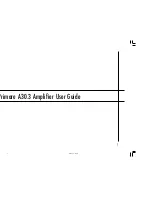
CONCEPT
SYSTEM
EXAMPLES
CONNECTIONS
PR
ODUCTS
BLOCK
D
IA
GRAMS
33
3
CONNECTIONS
WU-ZM001E
CONCEPT
SYSTEM
EXAMPLES
CONNECTIONS
PR
ODUCTS
BLOCK
D
IA
GRAMS
32
3
CONNECTIONS
WU-ZM001E
CONNECTIONS AND SETTINGS
Warning:
• Be sure to turn off power before connecting or configuring settings.
Be sure to turn off the device supplying power to the Sound Message Unit.
Leaving power supplied creates the risk of electric shock and damage to equipment.
Installing the Sound Message Unit to the mixing power amplifier and
configuring connections
1. Remove the top cover of the mixing power
amplifier (Amplifier).
4. Put 3 wiring cables on the heat sink and keep
them there.
Under this condition, push this unit all the way in and fix
this unit to the Amplifier with the 2 screws, which are
removed in step 2.
2. Remove the front blank panel from the Amplifier.
3.
Remove the cable connected to CN14 on the main
board of the Amplifier.
Connect two internal wiring cables (accessories)
separately to CN12 and CN6 on the Amplifier's main
board.
Note:
Uplift the front panel side of this unit when inserting it into the
Amplifier. Or else, the cable clamp on the top of this unit may make
a hindrance against inserting
Warning:
Be cautious not to get your finger clamped when inserting this unit
into the Mixing Power Amplifier.
CN14
CN12
CN6
CN14
CN6
CN12
Cable clamp
6. Fasten the top of the Sound Message Unit and
the Amplifier's frame with two screws
(provided).
5. Connect the 3 cables to CN1 and CN2 on the
back of this unit, and to CN200 on the side of
this unit. Then clamp the cables as shown
below with the cable clamp, which is installed
on this unit. (The cable clamp is made of metal
and shielded with black vinyl.)
7. Replace the Amplifier's top cover.
Fix the Amplifier's top cover with the screws, which Are
removed in step1.
Connecting MSG Control Input
MSG Control Input is connected as shown below.
Heat sink
CN1 CN2
CN6
CN12
Clamp here
Cable clamp
CN200
Heat sink
Cable clamp
No-voltage make contact
No-voltage make contact
No-voltage make contact
No-voltage make contact
Standardized clock
(Radio synchronized clock,etc.)
















































